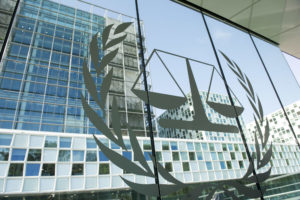Sudan’s President, Omar al-Bashir, recently traveled to two nearby African nations and faced no consequences, despite the fact that he is wanted by the International Criminal Court (ICC) for counts of genocide, war crimes, and crimes against humanity.
On May 8, 2016 Bashir traveled to Djibouti for the inauguration of President Ismail Omar Guelleh. One week later, on May 12th, Bashir was in Uganda for the inauguration of President Yoweri Museveni, who was sworn in to his fifth term in office (he has been President since 1986).
Djibouti and Uganda are both signatories to the Rome Statute (the piece of international law that created the ICC), and as such are technically obligated by international law to arrest Bashir. Despite their obligation, Bashir was welcomed with open arms. President Museveni even went one step further and took time at his inauguration to disparage the ICC, calling it a “useless body.” This statement by President Museveni caused envoys from western countries, including the U.S. to walk out in protest.
While Bashir continues to avoid justice, there is something different about his travel to Uganda and Djibouti; both of these countries have close relationships with the United States. The United States is Uganda’s largest bilateral donor; although tensions between the two states have risen in recent years due to Uganda’s anti-gay law and role in the South Sudan conflict. Meanwhile, Djibouti is home to a strategic U.S. drone base that the U.S. is paying the Djibouti government $70 million per year to rent through the year 2044.

Omar al-Bashir Photo by: U.S. Navy/Jesse B. Awalt
It is extremely disheartening that with that kind of leverage, the U.S. could not influence Uganda’s or Djibouti’s decision to arrest Bashir, or at the very least not invite him to their country. This is a clear example of the limited diplomatic power the U.S. wields in the region, a testament to the power of self-interest, as well as an example of the ICC’s dwindling support from African leaders.
African leaders, much like U.S. leaders, do not want to find themselves or their soldiers on the receiving end of an ICC arrest warrant. This makes it very difficult to enforce ICC arrest warrants against sitting heads of state. David Bosco, an assistant professor at American University and expert on the ICC, explains the issue in saying, “African leaders have had few complaints when the court goes after rebels or militia leaders in Uganda or the Democratic Republic of Congo. It’s the pursuit of senior government officials that has provoked the tension.”
Until international law is applied universally, it will continue to be difficult to implement. When leaders like Bashir, or South Sudan’s Salva Kiir and Riek Machar who are responsible for war crimes and crimes against humanity, are able to not only avoid facing justice, but remain in power, it makes a clear statement to other leaders that they can get away with some of the most heinous violations of human rights.
The international community is in desperate need of restructuring how it views, applies, and enforces international law. This is especially true when the violators of international law are state actors and sitting heads of state. Until the United Nations and its member countries are willing to enforce the laws they create and sign-onto, genocide and mass atrocity crimes will continue to go unpunished.


